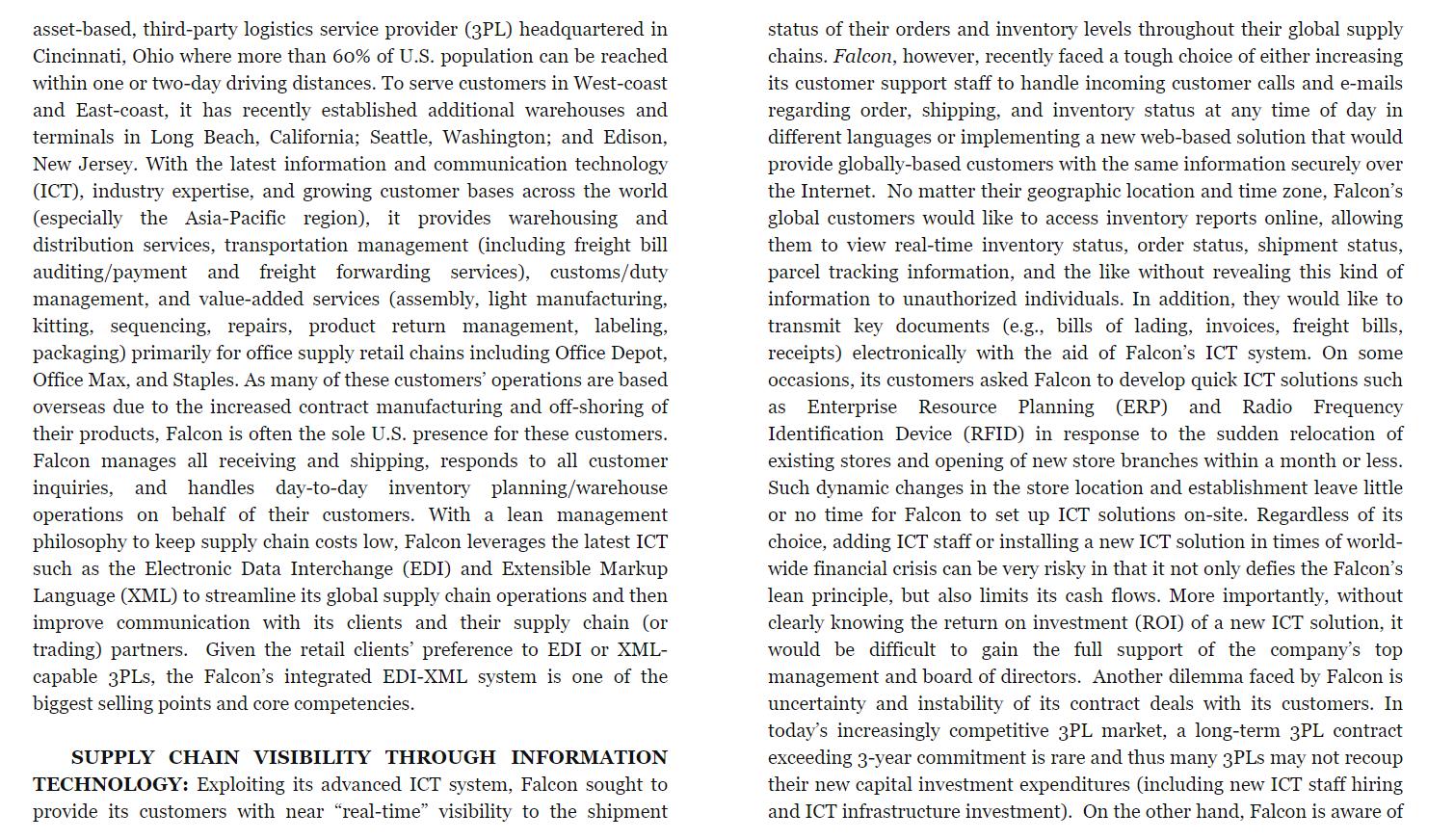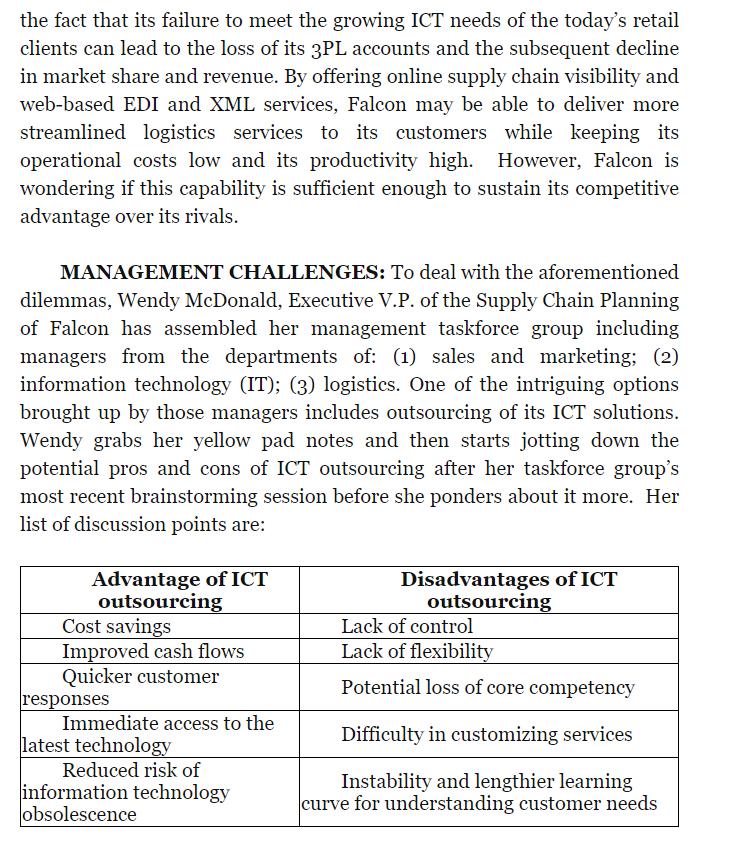Answered step by step
Verified Expert Solution
Question
1 Approved Answer
Case: Falcon Supply Chain Solutions This case is based on the fictitious but real-world like situation. GLOBAL PRESENCE: Falcon Supply Chain Solutions is a





Case: Falcon Supply Chain Solutions This case is based on the fictitious but real-world like situation. GLOBAL PRESENCE: Falcon Supply Chain Solutions is a leading asset-based, third-party logistics service provider (3PL) headquartered in status of their orders and inventory levels throughout their global supply chains. Falcon, however, recently faced a tough choice of either increasing its customer support staff to handle incoming customer calls and e-mails regarding order, shipping, and inventory status at any time of day in different languages or implementing a new web-based solution that would Cincinnati, Ohio where more than 60% of U.S. population can be reached within one or two-day driving distances. To serve customers in West-coast and East-coast, it has recently established additional warehouses and terminals in Long Beach, California; Seattle, Washington; and Edison, New Jersey. With the latest information and communication technology (ICT), industry expertise, and growing customer bases across the world (especially the Asia-Pacific region), it provides warehousing and distribution services, transportation management (including freight bill auditing/payment and freight forwarding services), customs/duty management, and value-added services (assembly, light manufacturing, kitting, sequencing, repairs, product return management, labeling, packaging) primarily for office supply retail chains including Office Depot, Office Max, and Staples. As many of these customers' operations are based overseas due to the increased contract manufacturing and off-shoring of their products, Falcon is often the sole U.S. presence for these customers. Falcon manages all receiving and shipping, responds to all customer inquiries, and handles day-to-day inventory planning/warehouse operations on behalf of their customers. With a lean management philosophy to keep supply chain costs low, Falcon leverages the latest ICT such as the Electronic Data Interchange (EDI) and Extensible Markup Language (XML) to streamline its global supply chain operations and then improve communication with its clients and their supply chain (or trading) partners. Given the retail clients' preference to EDI or XML- capable 3PLS, the Falcon's integrated EDI-XML system is one of the biggest selling points and core competencies. provide globally-based customers with the same information securely over the Internet. No matter their geographic location and time zone, Falcon's global customers would like to access inventory reports online, allowing them to view real-time inventory status, order status, shipment status, parcel tracking information, and the like without revealing this kind of information to unauthorized individuals. In addition, they would like to transmit key documents (e.g., bills of lading, invoices, freight bills, receipts) electronically with the aid of Falcon's ICT system. On some occasions, its customers asked Falcon to develop quick ICT solutions such Enterprise Resource Planning (ERP) and Radio Frequency Identification Device (RFID) in response to the sudden relocation of as existing stores and opening of new store branches within a month or less. Such dynamic changes in the store location and establishment leave little or no time for Falcon to set up ICT solutions on-site. Regardless of its choice, adding ICT staff or installing a new ICT solution in times of world- wide financial crisis can be very risky in that it not only defies the Falcon's lean principle, but also limits its cash flows. More importantly, without clearly knowing the return on investment (ROI) of a new ICT solution, it would be difficult to gain the full support of the company's top management and board of directors. Another dilemma faced by Falcon is uncertainty and instability of its contract deals with its customers. In today's increasingly competitive 3PL market, a long-term 3PL contract exceeding 3-year commitment is rare and thus many 3PLS may not recoup their new capital investment expenditures (including new ICT staff hiring SUPPLY CHAIN VISIBILITY THROUGH INFORMATION TECHNOLOGY: Exploiting its advanced ICT system, Falcon sought to provide its customers with near "real-time" visibility to the shipment and ICT infrastructure investment). On the other hand, Falcon is aware of the fact that its failure to meet the growing ICT needs of the today's retail clients can lead to the loss of its 3PL accounts and the subsequent decline in market share and revenue. By offering online supply chain visibility and web-based EDI and XML services, Falcon may be able to deliver more streamlined logistics services to its customers while keeping its operational costs low and its productivity high. However, Falcon is wondering if this capability is sufficient enough to sustain its competitive advantage over its rivals. MANAGEMENT CHALLENGES: To deal with the aforementioned dilemmas, Wendy McDonald, Executive V.P. of the Supply Chain Planning of Falcon has assembled her management taskforce group including managers from the departments of: (1) sales and marketing; (2) information technology (IT); (3) logistics. One of the intriguing options brought up by those managers includes outsourcing of its ICT solutions. Wendy grabs her yellow pad notes and then starts jotting down the potential pros and cons of ICT outsourcing after her taskforce group's most recent brainstorming session before she ponders about it more. Her list of discussion points are: Advantage of ICT outsourcing Cost savings Improved cash flows Quicker customer responses Immediate access to the Disadvantages of ICT outsourcing Lack of control Lack of flexibility Potential loss of core competency latest technology Difficulty in customizing services Reduced risk of information technology obsolescence Instability and lengthier learning curve for understanding customer needs Since Wendy is unsure of the accuracy of the above list and her managers continue to argue about the prospect of ICT outsourcing, she still gets confused and undecided about Falcon's future courses of action. (3) What are the most important challenges (e.g., compatibility, security, affordability) of Falcon's global ICT operations? (List at least three potential challenges and explain how to cope with these challenges.)
Step by Step Solution
★★★★★
3.35 Rating (164 Votes )
There are 3 Steps involved in it
Step: 1
Challenges 1Pace of change 2 Lack of knowledge 3 Changing roles and norms How to cope with these cha...
Get Instant Access to Expert-Tailored Solutions
See step-by-step solutions with expert insights and AI powered tools for academic success
Step: 2

Step: 3

Ace Your Homework with AI
Get the answers you need in no time with our AI-driven, step-by-step assistance
Get Started


